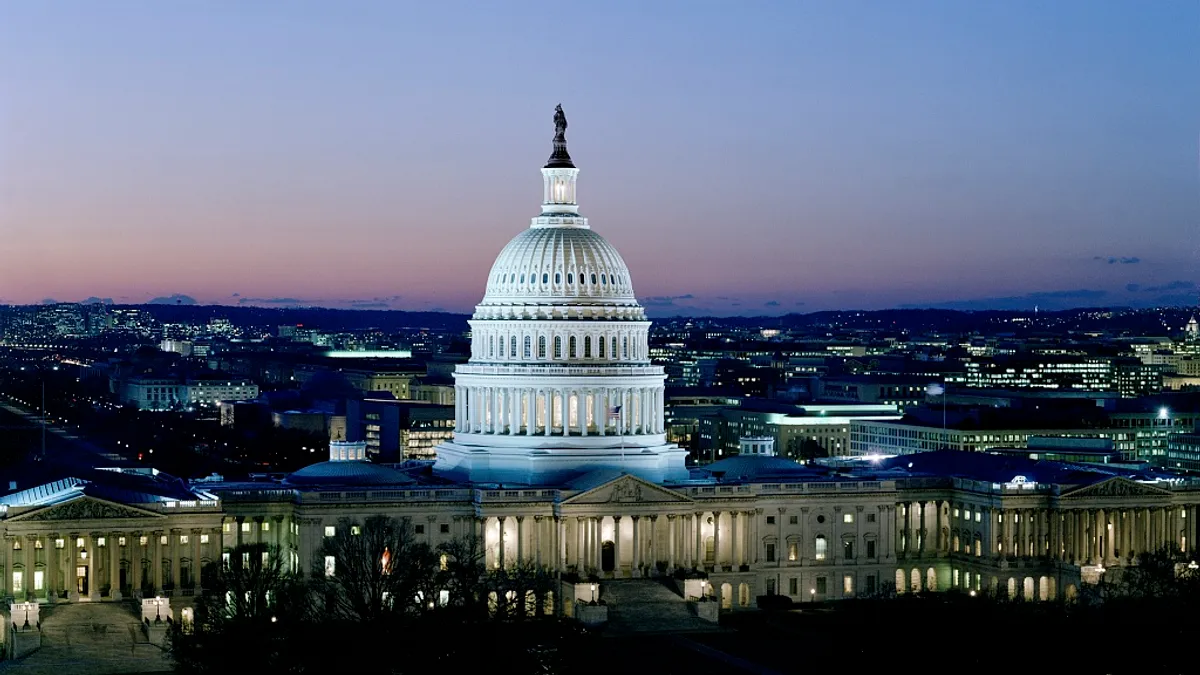Dive Brief:
- The Senate Homeland Security and Governmental Affairs Committee last week advanced a half dozen bills that would make it more difficult for the federal government to enact new rules and regulations, including the Regulatory Accountability Act (RAA), which activists have dubbed the "license to kill" bill.
- The RAA would require a cost-benefit analysis be performed on new regulations and require the government to adopt the most cost-effective. Public interest group Public Citizen estimates it would add 53 steps to major rulemaking, potentially doubling the time it takes to finalize regulations.
- A version of the RAA was passed by the House in January. U.S. Sens. Rob Portman (R-OH) and Heidi Heitkamp (D-ND) introduced the Senate version, which they say aims to "make federal regulations smarter and more effective so they better support businesses."
Dive Insight:
The Regulatory Accountability Act has sparked outrage among activists who say it prioritizes business concerns over public health and environmental protections by throwing up needless barriers to new rulemakings.
The RAA and a House companion bill would would require cost-benefit analysis on any regulation that would have an impact on the economy of greater than $100 million annually. The House version would require agencies to choose the "least expensive" regulation, while the Senate version would require it to choose the most "cost-effective."
Other provisions of the Regulatory Accountability Act would create an automatic review process for major regulations at least once every 10 years, and allow federal agency hearings on significant rules.
The Senate bill would also require courts to review the factual determinations underlying regulations with $1 billion of impact or greater annually. It would not, according to an explainer from Portman's office, affect Chevron deference, but environmental activists are concerned it would give judges further license to overturn federal rules.
The Senate bill was passed through committee by a 9-5 vote last week. A comparison of it and House bill, HR 5, can be found here.
According to the Environmental Working Group, the RAA and a few other bills "would create an impenetrable gauntlet of studies and reviews that no regulator could ever navigate." The Center for American Progress calls the bill a "license to kill" and the Environmental Defense Fund published a convoluted infographic made to show how the law would complicate federal rulemaking.
Sponsor Heitkamp said in a statement that federal regulations maintain safety and a clean environment, "but sometimes regulations don’t work as intended and create red tape. ... All across North Dakota, the biggest concern I hear from business owners and workers is about regulations hurting their abilities to do their jobs."
The Bakken Shale has made Heitkamp's North Dakota second only to Texas in oil production, and the deregulatory measures continue a trend from conservative Congressional leadership and the new White House to roll back rules on energy production.
In March, President Trump signed an executive order directing the U.S. Environmental Protection Agency to review the Clean Power Plan and other greenhouse gas regulations for the power sector, a first step in rolling back the Obama-era climate rules.
According to Morning Consult, Trump has blocked 13 Obama rules under the Congressional Review Act.
Other measures passed by the Senate committee last week included the Midnight Rules bill, which would make rolling back the previous administration's work easier. That bill passed 8-6.
Heitkamp's Early Participation in Regulations Act also passed 11-3, the Washington Examiner notes. It would require agencies to issue advanced copies of regulations 90 days before they are officially published in the Federal Register.













